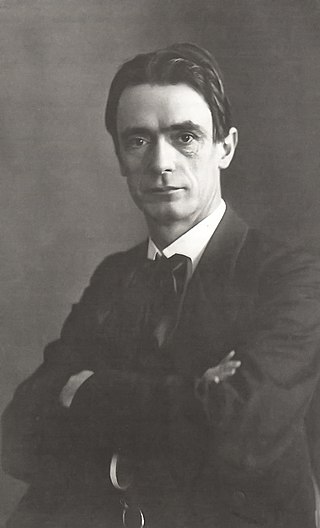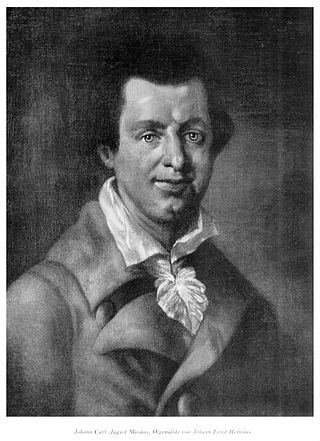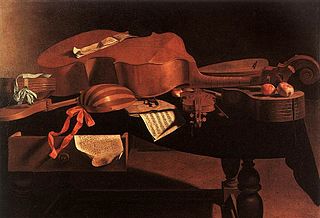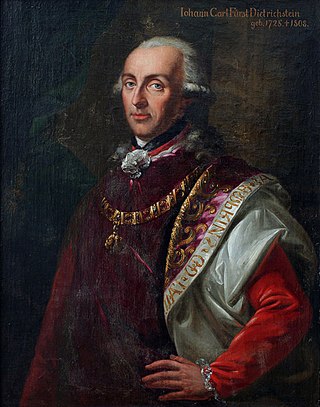Related Research Articles
Anthroposophy is a spiritual new religious movement which was founded in the early 20th century by the esotericist Rudolf Steiner that postulates the existence of an objective, intellectually comprehensible spiritual world, accessible to human experience. Followers of anthroposophy aim to engage in spiritual discovery through a mode of thought independent of sensory experience. Though proponents claim to present their ideas in a manner that is verifiable by rational discourse and say that they seek precision and clarity comparable to that obtained by scientists investigating the physical world, many of these ideas has been termed pseudoscientific by those outside the movement.

German literature comprises those literary texts written in the German language. This includes literature written in Germany, Austria, the German parts of Switzerland and Belgium, Liechtenstein, Luxembourg, South Tyrol in Italy and to a lesser extent works of the German diaspora. German literature of the modern period is mostly in Standard German, but there are some currents of literature influenced to a greater or lesser degree by dialects.
The occult, sometimes called esotericism and literally meaning "unseen" or "obscured", is the category of practices, beliefs and knowledge in all fields which remains hidden or encrypted from others, usually the general public, either deliberately or incidentally. Commonly, it also refers to paranormal or supernatural knowledge, beliefs and practices which generally fall outside the scope of mainstream religion and science, including phenomena of otherworldly agency, such as magic and its varied spells. While experimental spiritualists, secret societies and intelligence agencies are best known for using occultism in the modern world, it has played a major role throughout history, most commonly used to defend sacred knowledge from persecution, i.e. by practitioners of folk-spirituality and alchemy to defend against widespread persecution and extermination by the Catholic church. Occultism may also be implemented for the protection of the general public by insulating dangerous information such as weapons of mass destruction. Within systems of scarcity, it is often used to maintain a competitive advantage over others who are not initiated. Sometimes, occultism may occur within social systems in an accidental manner, usually as a consequence of systemic dysfunction or within a disinformation system. The occult may also simply refer to, and manifest within, areas of perceptual limitation.

Rudolf Joseph Lorenz Steiner was an Austrian occultist, social reformer, architect, esotericist, and claimed clairvoyant. Steiner gained initial recognition at the end of the nineteenth century as a literary critic and published works including The Philosophy of Freedom. At the beginning of the twentieth century he founded an esoteric spiritual movement, anthroposophy, with roots in German idealist philosophy and theosophy. His teachings are influenced by Christian Gnosticism. Many of his ideas are pseudoscientific. He was also prone to pseudohistory.

Christian theosophy, also known as Boehmian theosophy and theosophy, refers to a range of positions within Christianity that focus on the attainment of direct, unmediated knowledge of the nature of divinity and the origin and purpose of the universe. They have been characterized as mystical philosophies. Theosophy is considered part of Western esotericism, which believes that hidden knowledge or wisdom from the ancient past offers a path to illumination and salvation.

Rosicrucianism is a spiritual and cultural movement that arose in early modern Europe in the early 17th century after the publication of several texts announcing to the world a new esoteric order. Rosicrucianism is symbolized by the Rosy Cross or Rose Cross. There have been several Rosicrucian organizations since the initial movement was founded, including the Order of the Golden and Rosy Cross (1750s–1790s), the Societas Rosicruciana in Anglia (1865–present), and the Hermetic Order of the Golden Dawn (1887–1903).

German Romanticism was the dominant intellectual movement of German-speaking countries in the late 18th and early 19th centuries, influencing philosophy, aesthetics, literature, and criticism. Compared to English Romanticism, the German variety developed relatively early, and, in the opening years, coincided with Weimar Classicism (1772–1805).

Johann Gottfried von Herder was a German philosopher, theologian, poet, and literary critic. He is associated with the Enlightenment, Sturm und Drang, and Weimar Classicism. He was a Romantic philosopher and poet who argued that true German culture was to be discovered among the common people. He also stated that it was through folk songs, folk poetry, and folk dances that the true spirit of the nation was popularized. He is credited with establishing or advancing a number of important disciplines: hermeneutics, linguistics, anthropology, and "a secular philosophy of history."

The University of Ingolstadt was founded in 1472 by Louis the Rich, the Duke of Bavaria at the time, and its first Chancellor was the Bishop of Eichstätt. It consisted of four faculties: theology, law, artes liberales and medicine, all of which were contained in the Hoheschule. The university was modeled after the University of Vienna. Its chief goal was the propagation of the Christian faith. The university closed in May 1800, by order of the Prince-elector Maximilian IV.

Johann Ludwig "Lutz" Graf Schwerin von Krosigk was a German senior government official who served as the minister of finance of Germany from 1932 to 1945 and de facto chancellor of Germany during May 1945.

Western esotericism, also known as esotericism, esoterism, and sometimes the Western mystery tradition, is a term scholars use to classify a wide range of loosely related ideas and movements that developed within Western society. These ideas and currents are united since they are largely distinct both from orthodox Judeo-Christian religion and Age of Enlightenment rationalism. It has influenced various forms of Western philosophy, mysticism, religion, pseudoscience, art, literature, and music.

The University of Strasbourg is a public research university located in Strasbourg, France, with over 52,000 students and 3,300 researchers. Founded in the 16th century by Jean Sturm, it was an intellectual hotbed during the Age of Enlightenment.
Modern philosophy is philosophy developed in the modern era and associated with modernity. It is not a specific doctrine or school, although there are certain assumptions common to much of it, which helps to distinguish it from earlier philosophy.

Esoteric Christianity is a mystical approach to Christianity which features "secret traditions" that require an initiation to learn or understand. The term esoteric was coined in the 17th century and derives from the Greek ἐσωτερικός.

Johann Karl August Musäus was a German author. He was one of the first collectors of German folk stories, most celebrated for his Volksmärchen der Deutschen (1782–1787), a collection of German fairy tales retold as satires.

Baroque music refers to the period or dominant style of Western classical music composed from about 1600 to 1750. The Baroque style followed the Renaissance period, and was followed in turn by the Classical period after a short transition. The Baroque period is divided into three major phases: early, middle, and late. Overlapping in time, they are conventionally dated from 1580 to 1650, from 1630 to 1700, and from 1680 to 1750. Baroque music forms a major portion of the "classical music" canon, and is widely studied, performed, and listened to. The term "baroque" comes from the Portuguese word barroco, meaning "misshapen pearl". The works of George Frideric Handel and Johann Sebastian Bach are considered the pinnacle of the Baroque period. Other key composers of the Baroque era include Claudio Monteverdi, Domenico Scarlatti, Alessandro Scarlatti, Alessandro Stradella, Tomaso Albinoni, Johann Pachelbel, Henry Purcell, Antonio Vivaldi, Georg Philipp Telemann, Jean-Baptiste Lully, Jean-Philippe Rameau, Marc-Antoine Charpentier, Arcangelo Corelli, François Couperin, Johann Hermann Schein, Heinrich Schütz, Samuel Scheidt, Dieterich Buxtehude, Gaspar Sanz, José de Nebra, Antonio Soler, Carlos Seixas and others.
Nicholas Bonneville was a French bookseller, printer, journalist, and writer. He was also a political figure of some relevance at the time of the French Revolution and into the early years of the next century.

Karl Johann Baptist, Prince of Dietrichstein, was a German prince, member of the House of Dietrichstein, 7th Prince (Fürst) of Dietrichstein zu Nikolsburg, Princely Count of Tarasp, Baron (Freiherr) of Hollenburg, Finkenstein and Thalberg.
References
- 1 2 3 4 5 Frank Paul Bowman, "Illuminism", in Peter France, ed., The New Oxford Companion to Literature in French (Oxford University Press, 1995), retrieved 23 April 2024.
- 1 2 3 4 5 6 7 8 9 10 11 12 13 14 15 Christine Bergé, "Illuminism", in Wouter J. Hanegraaff, ed., Dictionary of Gnosis and Western Esotericism (Brill, 2006), retrieved 23 April 2024.